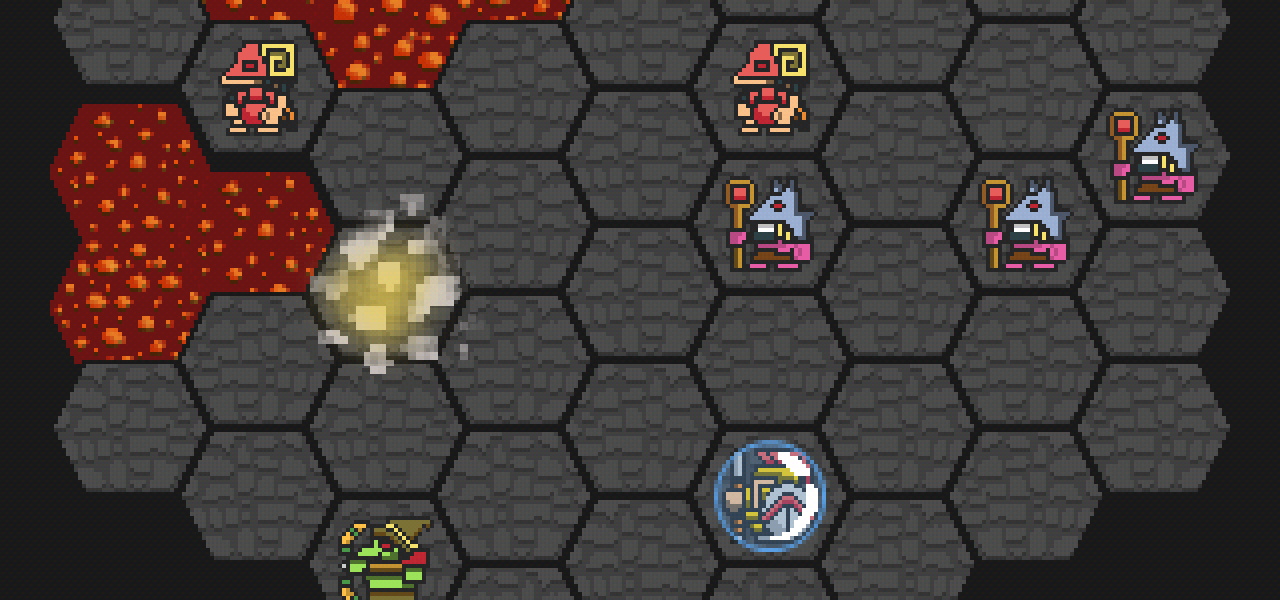
Featured Blog | This community-written post highlights the best of what the game industry has to offer. Read more like it on the Game Developer Blogs or learn how to Submit Your Own Blog Post
Reading in strategy games
In a strategy game, reading is the process of parsing the information on the board, allowing players to identify threats and opportunities. This article offers a new lens to help understand designing games which are interesting to "read".

In a strategy game, reading is the process of parsing the information on the board. This allows players to identify threats and opportunities; for example:
If a particular area is safe from enemy attack
That the enemy will be able to perform a killer move next turn if left unchecked
A chokepoint you can take advantage of
After reading the board, the remainder of the player’s turn is spent deciding on the best path of action. When a move is chosen the enemy responds, the game state changes, and the cycle repeats.
Examples
As a result of their abstraction and formality, reading is an especially important component aspect of Chess-style games, from Advance Wars to X-Com; but the proportion of mental effort spent reading vs decision making is very different.
Hoplite’s focus on one player character results in a small number of potential moves. After carefully reading the board, the player might find only a two or three moves where they’re safe from damage, and the limited long-term strategy of the game makes deciding between these relatively trivial.

Fire Emblem also involves a lot of reading and helpfully provides an overlay showing all the spaces the enemy can attack. This massively reduces the information to be read; a smart choice for a game that features giant maps and up to around 50 units on the board at a time!

Into The Breach goes in the opposite extreme; showing the player everything enemies are able to do as efficiently as possible so that the player can focus almost exclusively on decision making.

In Chess, separating the stupid moves from those worth considering defines low-level play, where games are won or lost by players failing to spot opportunities or threats, rather than by better decision making. A part of what makes Chess such a popular game is that even after becoming incredibly skilled readers the decision making phase offers more enough to keep players engaged for years.
Complexity
The raw complexity of reading the chessboard several turns ahead (the information horizon) means that players must decide for themselves when they have enough information to act. Games with more information that players could use than they can feasibly read can be incredibly deep.
Conversely, “wide” games offer the player a huge amount of information that has to be read before any decision making can occur. Just like reading a book, literacy is the skill required to access the content. Expecting players to learn (or already have) the literacy required to read a game can be very intimidating and can reduce the size of a game’s audience. This might not necessarily be a bad thing; incredibly sophisticated works can be produced for highly literate audiences. In the gaming world, genres allow developers to build off a common language.
The fluency lifecycle
The process of learning to play a game can be broken up into several stages.
The new player experiments with the ruleset and discovers the basic elements communicated by the game. This process can be frustrating if players fail to visually differentiate between elements of the map, identify the purpose of game objects, or understand the effects of their actions. Depending on their persistence and existing literacy, players may quit.
After learning what the basics, there is a honeymoon period where players first identify and capitalise on a killer move or spot a new pattern. This process is immensely rewarding, and these are moments that designers should aspire to create as part of their learning curve.
Competent players are able to read the game efficiently. Exercising their ability is both familiar and satisfying, although far less rewarding than the thrills that come with learning to read in the first place. New ‘words’ become increasingly rare and interest drops off.
Expert players grok the most complex patterns the game can offer, and what was once a creative decision becomes merely another word in their lexicon. The decision-making space reduces exponentially until the game is “solved” and can simply be read.
By changing rules and adding new content designers can extend a game’s life, but few games are evergreen. It’s worth pointing out that while longevity is often seen as a virtue, the rate at which a player is able to learn and the sense of mastery offered by less-complex games can create incredibly rewarding experiences which are accessible to a far wider audience. On the other hand, games which are able to support rich decision making allow the game’s challenge to transition from reading to strategic thinking which can be far harder to grok. These games may never be solved and are able to retain the interest of a certain breed of player for a lifetime.
Understanding your game
When considering a new design it’s important to consider how much time it will take for players to understand the information you’re laying out for them, but also to understand whether your game’s inherent focus lies in reading or decision making. Since Hoplite is far more about spotting enemy attack patterns than strategy, adding Fire Emblem’s enemy attack range overlay may not be a good design decision. For a game like chess, there are strong arguments both for and against! Whatever your focus, it’s always important to pay close attention to what you’re making players read, and consider how you can make reading more fulfilling to learn and practice.
Thanks for reading! I'm @tomkail, a developer on Inkle's upcoming Heaven's Vault and hobbyist game designer. This article was originally posted on my personal design blog
Read more about:
Featured BlogsAbout the Author(s)
You May Also Like







.jpeg?width=700&auto=webp&quality=80&disable=upscale)








